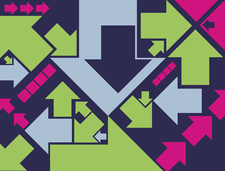Managing notes with Zim
Organizer

© Alexey Shkitenkov, Fotolia.com
The Zim information manager offers far more than digital notes by exploiting data networking options.
Zim is a handy desktop tool that combines wiki techniques with notes, a calendar, and to-do lists to create a versatile notepad on steroids. The tool supports a number of interesting integration options. For instance, you can directly paste images and easily link to external files. Zim builds a text file for each note and stores the notes in wikitext format. This means you can read your notes at the command line – a major benefit if you only have remote SSH-based access.
Installation
The package sources offered by popular distributions tend to offer users an obsolete version of Zim, if at all. Because of major improvements in the past few months, installing the current 0.27 version from the author's homepage makes more sense [1]. The source code package is up for grabs and you can use either a Perl script or make to build and install.
Before you can finally type make install, be prepared for blood, sweat, and tears. Several dependencies need manual attention, and Perl bindings and a couple of CPAN Perl modules must be installed. Ubuntu and Debian users will probably prefer the pain-free deb package, which is also available from the homepage. Alternatively, check out the Medibuntu repository [2], which has a current version of Zim that you can install easily via apt-get or Synaptic.
[...]
Buy this article as PDF
(incl. VAT)
Buy Linux Magazine
Subscribe to our Linux Newsletters
Find Linux and Open Source Jobs
Subscribe to our ADMIN Newsletters
Support Our Work
Linux Magazine content is made possible with support from readers like you. Please consider contributing when you’ve found an article to be beneficial.

News
-
The Next Linux Kernel Turns 7.0
Linus Torvalds has announced that after Linux kernel 6.19, we'll finally reach the 7.0 iteration stage.
-
Linux From Scratch Drops SysVinit Support
LFS will no longer support SysVinit.
-
LibreOffice 26.2 Now Available
With new features, improvements, and bug fixes, LibreOffice 26.2 delivers a modern, polished office suite without compromise.
-
Linux Kernel Project Releases Project Continuity Document
What happens to Linux when there's no Linus? It's a question many of us have asked over the years, and it seems it's also on the minds of the Linux kernel project.
-
Mecha Systems Introduces Linux Handheld
Mecha Systems has revealed its Mecha Comet, a new handheld computer powered by – you guessed it – Linux.
-
MX Linux 25.1 Features Dual Init System ISO
The latest release of MX Linux caters to lovers of two different init systems and even offers instructions on how to transition.
-
Photoshop on Linux?
A developer has patched Wine so that it'll run specific versions of Photoshop that depend on Adobe Creative Cloud.
-
Linux Mint 22.3 Now Available with New Tools
Linux Mint 22.3 has been released with a pair of new tools for system admins and some pretty cool new features.
-
New Linux Malware Targets Cloud-Based Linux Installations
VoidLink, a new Linux malware, should be of real concern because of its stealth and customization.
-
Say Goodbye to Middle-Mouse Paste
Both Gnome and Firefox have proposed getting rid of a long-time favorite Linux feature.
